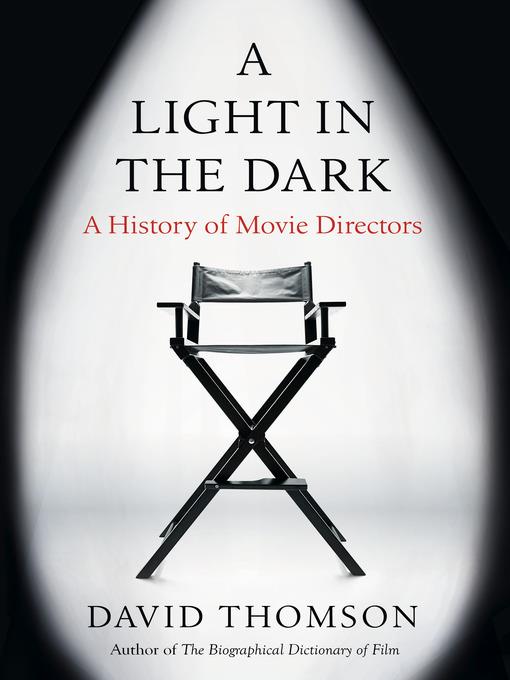
A Light in the Dark
A History of Movie Directors
کتاب های مرتبط
- اطلاعات
- نقد و بررسی
- دیدگاه کاربران
نقد و بررسی

November 1, 2020
A prolific film critic offers analyses of noteworthy directors. Despite the subtitle, Thomson presents a series of personal assessments of a handful of filmmakers. "I have omitted so many people," he admits. Indeed, there are chapters on Fritz Lang, Luis Bu�uel, Howard Hawks, and Orson Welles but not Sergei Eisenstein, Francois Truffaut, Akira Kurosawa, and many others. Much of this material appears in greater detail in other, better books, including some of Thomson's own works. A typically florid sentence is the author's appraisal of Hitchcock: "A time may come when he stands for Movies in the way Attila the Hun bestrides the Dark Ages or Cleopatra signifies Ancient Egypt." Thomson's opinions are often based on debatable logic. He notes with sadness that Jean Renoir's The Rules of the Game has fallen behind Vertigo in greatest-films surveys, but even readers who agree that Vertigo is the lesser film might be baffled by the author's claim that its triumph over Renoir's indictment of maladjusted sophisticates represents "opting for neurosis over reason." Curiously for such an acclaimed film critic, Thomson gets facts wrong. For example, he claims The Piano wasn't nominated for Best Picture the year Driving Miss Daisy won. The Piano came out four years after Daisy, and it was nominated but lost to Schindler's List. While the author makes some progressive statements--e.g., that the film industry needs more respect for women--he undercuts them with tin-eared comments, such as when noting the camera's infatuation with Catherine Deneuve in Belle de Jour: "I have a similar wish to dwell on the smoothness of Deneuve's skin." Only one chapter focuses on women directors. But at least the book has some memorable lines: "There are instants in Pierrot le Fou where its grasp of love and love's death are like hummingbirds on your veranda, while Doctor Zhivago is a pantechnicon struggling up a distant hill with a grand piano to be carried up the stairs." A well-meaning but flawed book about legendary filmmakers.
COPYRIGHT(2020) Kirkus Reviews, ALL RIGHTS RESERVED.

December 1, 2020
Legendary film critic Thomson (The Biographical Dictionary of Film) dissects decades of movie-making, chronicling how directors rose from obscurity to become larger-than-life celebrities. Thomson identifies as a curmudgeon, and his conversational tone is both authoritative and perplexing. He studies classic directors who well represent their decades, from Fritz Lang and Jean Renoir to Howard Hawks and Alfred Hitchcock, focusing on white men and spending much time on their romantic relationships and picks for leading men. He asserts that filmmakers direct for "access" to women, and his single chapter on female directors suggests that the successful women are those who make "male films." His lone chapter on minority directors focuses on Spike Lee, who he describes as challenging and admits to not particularly liking. Thomson's questionable opinions include the assertion that Woody Allen is a treasure who will eventually be recognized as such once again and his branding of Roman Polanski as a "ruffler of feathers." The author concludes with a nod to Alik Sakharov, who directed the brilliant final four episodes of Ozark yet is likely unfamiliar to the general public, as proof that directors are back in the shadows and unrecognized as the geniuses behind the work. VERDICT Thomson's own genius is his ability to remain one of the leading authorities on cinematic history, without shying away from the controversial. Cinephiles seeking provocative arguments will appreciate his work.--Lisa Henry, Kirkwood P.L., MO
Copyright 2020 Library Journal, LLC Used with permission.

January 4, 2021
Film critic Thomson (The Big Screen) returns in this scattershot meditation on some of the movie business’s most famous directors. In 14 essays, the author covers such directors as the “artful careerist” Fritz Lang, “intellectually brilliant” Jean-Luc Godard, and “rebel” Nicholas Ray. The book opens with a promise to show how “those intruders, the directors” became “heroes and masters” whose influence may be waning in the era of computer-generated imagery. But what ensues is less a history than a series of essays that each nominally focuses on one or more directors before devolving into unconvincing metaphors and tangents (such as a section wondering if Jane Campion is left-handed). There are insights to be found, about both directing and cinema in general: Godard, Thomson states, “was uncannily aware of (and angry about) the way romance was a commercial-cultural construct of reality being imposed upon us,” and Thomson’s analysis of Quentin Tarantino—“an advocate for an ideology that has had woeful consequences”—is refreshing and original. While film snobs may enjoy Thomson’s roving insights on whether “the cult of directors could be ending,” those looking for a comprehensive history of directorial masters will be left wanting.

March 15, 2021
Is the light enlightening or a way out of our fear of the dark?"" In the movies, it's both--the camera's light leading us into the heart of darkness or, alternately, offering a means of escape from that darkness, or so esteemed film critic Thomson argues in this provocative and engagingly eccentric history of film directors. Thomson focuses on seven seminal directors from cinema's early decades--D. W. Griffith, Fritz Lang, Jean Renoir, Luis Bu�uel, Howard Hawks, Alfred Hitchcock, and Orson Welles--with separate chapters on more contemporary figures, including female and minority directors. Recognizing that readers will inevitably quibble with his choices, Thomson acknowledges, ""My personal judgments could be left looking silly in history. Opinion can't be afraid of that."" But if we choose to take those opinions as opinions rather than challenging them as truth, there is much to enjoy here, especially in the chapter on Hawks, a director with an unwavering commitment to telling stories across multiple genres, from Red River to Bringing Up Baby. Best of all, the prose sparkles with flamboyant wit (like calling Hawks' screwball comedies a ""Forest of Arden for irony and ambiguity"").
COPYRIGHT(2021) Booklist, ALL RIGHTS RESERVED.

























دیدگاه کاربران